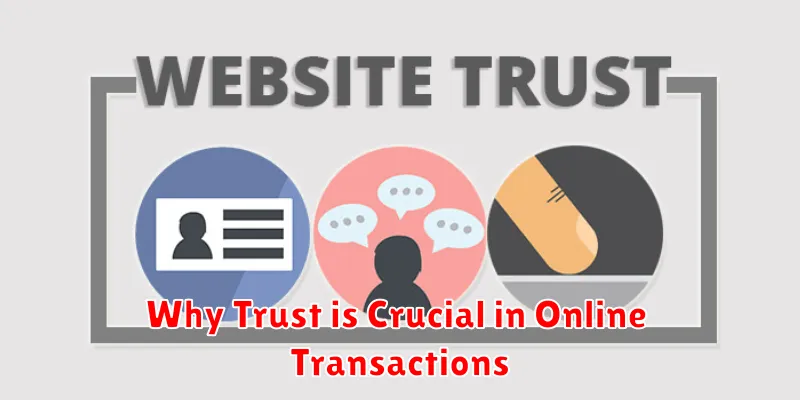Building trust and credibility is paramount for success in the competitive landscape of online business. This article will guide you through practical strategies to establish a strong online reputation, cultivate customer loyalty, and ultimately drive business growth. We’ll explore techniques for boosting your brand’s authenticity, managing your online presence effectively, and leveraging social proof to convince potential customers that you are a reliable and trustworthy source. Learn how to increase conversions and achieve lasting business success by mastering the art of building trust online.
Why Trust is Crucial in Online Transactions

In the digital marketplace, trust is the bedrock of successful online transactions. Without it, potential customers are hesitant to share personal information or make purchases. A lack of trust directly impacts conversion rates and overall business success.
Building trust fosters a positive customer experience, leading to repeat business and positive word-of-mouth referrals. Conversely, a lack of trust can result in abandoned carts, negative reviews, and reputational damage, significantly hindering growth.
Consumer confidence is paramount. Online shoppers need assurance that their transactions are secure, their data is protected, and the products or services delivered are as advertised. This requires transparency, security measures, and a commitment to customer satisfaction to cultivate and maintain trust.
Ultimately, trust is not just a desirable trait but a critical component for any online business striving for longevity and profitability. It underpins every aspect of the customer journey, from initial engagement to post-purchase support.
Creating a Professional Website and Branding
A professional website is crucial for building trust and credibility. It’s your online storefront, representing your brand’s image and values. A poorly designed site can instantly undermine your credibility.
Branding is more than just a logo; it’s the overall experience you offer. Consistent messaging, color palettes, and fonts across all platforms are vital. This unified brand identity instills confidence and recognition.
Website design should be clean, intuitive, and user-friendly. Fast loading times, clear navigation, and high-quality images contribute to a positive user experience. Mobile responsiveness is also essential.
Professional copywriting is critical. Your website content should clearly communicate your value proposition and highlight your expertise. Avoid jargon and focus on clear, concise language.
Security is paramount. Displaying security badges (like SSL certificates) and implementing secure payment gateways reassures customers that their information is protected.
Testimonials and reviews further build trust. Displaying positive feedback from satisfied clients adds social proof and strengthens your credibility.
Investing in professional website development and branding strategy is an investment in your business’s long-term success. A strong online presence is the foundation of a thriving online business.
Using Customer Reviews and Testimonials Effectively
Customer reviews and testimonials are powerful tools for building trust and credibility in your online business. They provide social proof, demonstrating that other customers have had positive experiences with your products or services.
To use them effectively, display reviews prominently on your website, particularly on product pages and your homepage. Consider using a dedicated reviews section or integrating them directly into your product descriptions. Showcase a variety of reviews, highlighting both positive and (occasionally) constructive criticisms to appear more authentic.
Focus on quality over quantity. A few genuine, detailed reviews are more impactful than many short, generic ones. Encourage customers to leave reviews by making the process easy and rewarding. You can offer incentives, such as discounts or entry into a contest.
Respond to reviews, both positive and negative, demonstrating your commitment to customer satisfaction. Addressing concerns publicly shows transparency and willingness to improve. Use high-quality visuals whenever possible, such as photos or videos of happy customers using your products.
Highlight key aspects within reviews, such as specific product features or benefits customers appreciated. This helps potential buyers quickly understand the value proposition and builds confidence in your offerings. Finally, always ensure the authenticity of your reviews; fake reviews can severely damage your reputation.
Providing Excellent Customer Service

Excellent customer service is paramount to building trust and credibility in your online business. It’s more than just responding to queries; it’s about exceeding customer expectations.
Responsiveness is key. Aim for quick and helpful replies to emails, messages, and social media comments. A timely response shows you value your customers’ time and concerns.
Empathy and understanding are crucial. Acknowledge customer frustrations and offer sincere apologies when necessary. Show you understand their perspective.
Problem-solving skills are essential. Effectively address customer issues, offering practical solutions and follow-up to ensure satisfaction. Go the extra mile to resolve complaints.
Proactive communication fosters trust. Keep customers informed about order status, shipping updates, and any relevant changes. Transparency builds confidence.
Personalized interactions create a stronger connection. Use customer names and remember past interactions whenever possible. This shows you value individual customers.
Gather feedback regularly. Use surveys and reviews to understand customer experiences and identify areas for improvement. Showing you value customer input demonstrates your commitment to excellence.
Offering Transparent Pricing and Policies
Transparency is paramount in building trust with online customers. Clearly outlining your pricing structure eliminates hidden fees and surprises, fostering a positive customer experience. Avoid ambiguous language; be specific and upfront about all costs associated with your products or services.
Similarly, accessible and easy-to-understand policies are crucial. Make your terms of service, refund policy, and privacy policy readily available on your website. Use plain language, avoiding legal jargon that can confuse customers. A simple FAQ section can address common questions and concerns proactively.
By demonstrating openness and honesty in your pricing and policies, you build a foundation of trust. Customers appreciate knowing exactly what they’re paying for and what to expect, making them more likely to engage with your business and recommend it to others. This transparency showcases your commitment to ethical business practices and strengthens your online reputation.
Securing Your Website with SSL and Trust Badges
Establishing trust is paramount for any online business. A significant step in achieving this is securing your website with SSL (Secure Sockets Layer). SSL encrypts the connection between your website and visitors’ browsers, protecting sensitive data like passwords and credit card information. This is indicated by the padlock icon in the browser address bar and the “https” prefix in the URL.
Beyond SSL, displaying trust badges from reputable security companies further reinforces your commitment to security. These badges visually reassure customers that their transactions are safe and that your website has undergone verification. Popular trust badges include those from companies like McAfee SECURE, Norton Secured Seal, and Trustwave.
Implementing SSL is a relatively straightforward process, often handled through your web hosting provider. Obtaining trust badges usually involves applying for a security certificate from a reputable provider and displaying their badge on your website. This simple investment significantly bolsters user confidence and contributes to a more trustworthy online presence.
Remember: While SSL and trust badges are crucial, they are only part of building a trustworthy business. Transparency, clear communication, and excellent customer service are equally important for fostering lasting customer relationships.
Publishing Valuable Content to Demonstrate Expertise

Establishing trust and credibility in your online business hinges on demonstrating expertise. Publishing valuable content is the cornerstone of this process. By consistently sharing insightful, well-researched, and helpful information, you position yourself as a thought leader in your industry.
High-quality content showcases your knowledge and understanding of your niche. This could include blog posts addressing common customer questions, in-depth guides offering practical solutions, or case studies detailing your successes. The key is to provide real value to your audience, addressing their pain points and offering solutions.
Consistency is crucial. Regularly publishing fresh, relevant content keeps your audience engaged and reinforces your authority. A consistent publishing schedule demonstrates your commitment to providing value and builds anticipation for your next piece of insightful content. Ultimately, this consistent delivery of value builds trust and credibility, leading to increased customer loyalty and business success.
How to Handle Negative Feedback Professionally
Negative feedback, while unpleasant, is a valuable opportunity to build trust and credibility in your online business. Responding professionally demonstrates your commitment to customer satisfaction and your willingness to improve.
First, acknowledge the feedback promptly and publicly. Thank the customer for their input, even if it’s negative. This shows you value their opinion.
Next, empathize with the customer’s experience. Use phrases like, “I understand your frustration,” or “I’m sorry you had this experience.” Avoid being defensive.
Then, apologize sincerely, even if you don’t believe you’re entirely at fault. An apology shows you care about the customer’s feelings.
Finally, offer a solution. This might involve a refund, a replacement product, or a discount on their next purchase. If the issue is a systemic problem, explain what steps you’re taking to prevent it from happening again.
By handling negative feedback professionally, you transform a potentially damaging situation into an opportunity to showcase your dedication to customer service and strengthen your online reputation. Remember, transparency and responsiveness are key to building trust.

